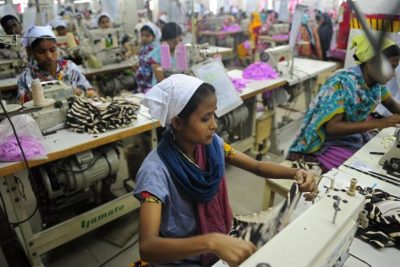Munir Uz Zaman/AFP
By
Sheuli Akter
Improved infrastructure and a more diversified economy can help Bangladesh increase economic growth, create meaningful jobs, and enhance the country’s structural transformation as a thriving middle-income economy, say two new Asian Development Bank (ADB) reports.
“The ready-made garments sector and overseas remittances have fuelled strong growth of over 6% in the past decade, allowing the economy to recently graduate to middle income status,” said Edimon Ginting, Director in ADB’s Economic Research and Regional Cooperation Department. “Moving forward, the country can sustain higher growth through investment in sectors such as light engineering, machinery repair, and agricultural cold chains. Better infrastructure and policy reforms can help the country capture these opportunities.”
The first study, Bangladesh: Consolidating Export-led Growth, uses economic diagnostic tools to identify critical constraints to growth and sets out policy recommendations to help tackle them.
Public-private partnerships can contribute to infrastructure upgrades in some of the country’s most successful economic sectors, while secured land ownership and improved urban planning and development will help attract more foreign investment, the report said. Reliable electricity, efficient urban transport systems, and measures to support new industries and economic activities are also important.
Poverty in Bangladesh declined rapidly from nearly 49% in 2000 to below 24% in 2016. The study notes that reducing poverty more evenly across the country, boosting access to financial services for low income groups, and strengthening social safety nets will further improve livelihoods and increase economic opportunities.
Bangladesh has been an innovator in microcredit services globally and there is significant scope to boost the sector further, particularly with the growing use of mobile technology. Incentive programs to improve financial services for small and micro depositors can also create a pool of funds that can be channeled for infrastructure development.
Other priority areas include improved access to power, better fuel pricing mechanisms, and increased energy conservation and efficiency. Private investment in power and oil and gas exploration and tapping further into regional electricity market could help Bangladesh meet its energy needs.
The second report, Bangladesh: Looking Beyond Garments, Employment Diagnostic Study, prepared jointly with the International Labour Organization (ILO), notes the integral role ready-made garments have played in the economy.
Beyond garments, there are promising sectors for diversifying the economy, including pharmaceuticals, IT services and tourism. Increasing vocational skills for workers, improving the quality of education, making better use of migrant labor, and enhancing access to finance will help develop industries outside the garment sector and widen job opportunities for women, in particular.
According to the study, the economy should grow at over 8% per year, to create enough productive jobs and reduce surplus labor.
The joint ADB-ILO study recommends accelerating the growth of decent work, a process which is underway under the framework of Bangladesh’s 7th Five Year Plan (FY2016-FY2020).
ADB, based in Manila, is dedicated to reducing poverty in Asia and the Pacific through inclusive economic growth, environmentally sustainable growth, and regional integration. Established in 1966, ADB in December 2016 will mark 50 years of development partnership in the region. It is owned by 67 members—48 from the region. In 2015, ADB assistance totaled $27.2 billion, including cofinancing of $10.7 billion.



No Comments Yet!
You can be first to comment this post!